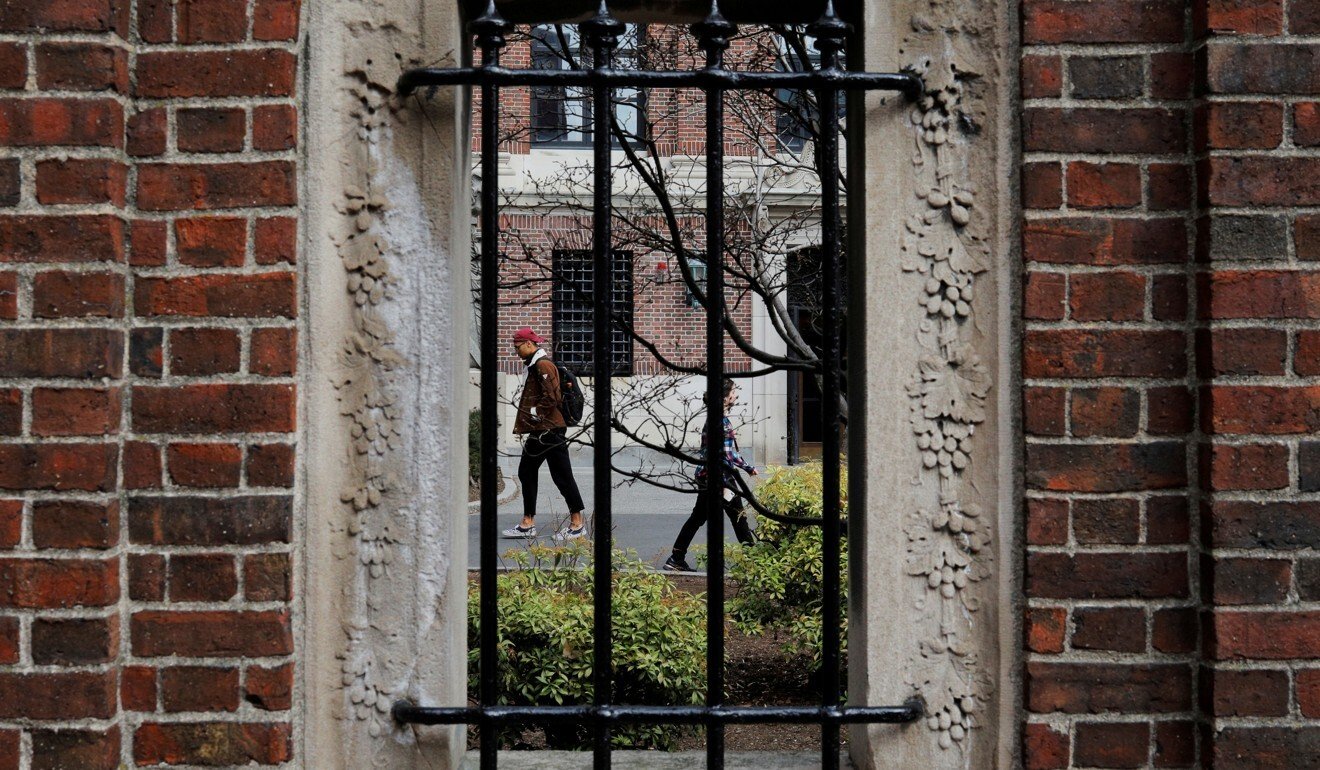
Facebook, US states join Harvard, MIT’s fight against Trump administration directive to deport online-only foreign students
- Tech firms argue the directive violates a federal law meant to protect businesses from arbitrary decisions that could adversely affect operations
- Government argues that earlier guidance warned that international students’ ability to remain in US for online courses was subject to change

Facebook, the US Chamber of Commerce and more than a dozen other tech firms and business advocacy groups aligned to support Harvard University and the Massachusetts Institute of Technology in their bid to fight a US government directive that threatens to deport thousands of international students.
Google, Twitter and Spotify are also signatories to the amicus brief filed on Monday with the US District Court in Boston, Massachusetts, arguing that the directive issued by the US Department of Homeland Security (DHS) and its Immigration and Customs Enforcement (ICE) division last week violated a decades-old federal law meant to protect businesses from arbitrary decisions that could adversely affect business operations.
“The Administrative Procedure Act [APA] required defendants … to consider the serious consequences for the US business community and the entire economy that would result from a directive requiring more than half of all international students to leave the country, and also to take account of the substantial reliance interests of US companies that would be disrupted by such a decision,” said the brief filed by Facebook.

Enacted in 1946, the APA requires agencies of the US government to, among other provisions, provide for public participation in their rule-making process, for instance through public commenting. Part of Harvard and MIT’s argument against ICE’s move includes the fact that there was no notice-and-comment period.
Scores of US states, municipalities and the District of Columbia have also joined the effort to block ICE’s move as the spread of Covid-19 in the country raises the risk that full classrooms will only exacerbate the pandemic.
On July 6, ICE rescinded the right of international students to remain in the US while taking online-only courses – an allowance granted in March in response to the coronavirus pandemic. The move gives universities offering online-only instruction until Wednesday to file “operational change plans”.
Schools offering a mix of online and in-person instruction to reduce the number of people on campus must issue certifications by August 4 for each international student remaining in the US for such a curriculum that they are taking a minimum number of online classes. These certifications could number “in the thousands per university”, according to Harvard and MIT’s complaint.
In a response filed on Monday on behalf of DHS and ICE, US Attorney Andrew Lelling pointed out that the ICE’s guidance in March, issued by its Student and Exchange Visitor Programme (SEVP), included a subject-to-change disclaimer, adding that “SEVP will continue to monitor the Covid-19 situation and will adjust its guidance as needed”.
“SEVP guidance has repeatedly advised stakeholders that the agency’s position during the pandemic is fluid. Given the volatile nature of the pandemic, SEVP guidance warns all schools and students – the guidance may be altered or superseded at any time,” Lelling said in the court document. “At no time did the agency issue a final rule limiting SEVP’s discretionary enforcement authority during the pandemic.”
Lelling further argued that “the July 6 policy announcement was not subject to the APA’s notice-and-comment requirements because it was not a legislative rule but, at most, a statement of policy”.
“The APA provides an exception to its notice-and-comment requirements for ‘general statements of policy’,” he said.
Meanwhile, Harvard, MIT and those supporting their case have cited the volatile nature of the pandemic to argue for more forbearance.
“For many students, returning to their home countries to participate in online instruction is impossible, impracticable, prohibitively expensive and/or dangerous”, according to Harvard and MIT’s complaint, which called the move “a cudgel to compel universities to alter their plans for the fall”.
The directive comes as the number of Covid-19 cases in the US continues to rise, forcing some state and local governments, including California’s, to close businesses that were allowed to reopen in recent weeks.

01:25
US colleges face US$15 billion hit as Chinese students stay away amid coronavirus pandemic
Health authorities in the US have confirmed more than 3.3 million cases and more than 135,000 deaths, according to a tally by The New York Times.
“The Trump administration didn’t even attempt to explain the basis for this senseless rule, which forces schools to choose between keeping their international students enrolled and protecting the health and safety of their campuses,” Massachusetts Attorney General Maura Healey, whose office is leading a separate lawsuit on behalf of a coalition of 17 states and Washington, DC. The states include California, New York and Pennsylvania.
Another amicus brief in support of Harvard and MIT was filed by a group led by the municipal governments of Los Angeles and Boston.
“There are more than 20,000 international students enrolled in colleges and universities located in the city of Los Angeles for the fall,” the document said. “Between Boston, Cambridge, Somerville and surrounding suburban areas, there are tens of thousands more.”
“All of those students will be affected by the outcome of this matter, and all of them are part of the economic engine fuelling … communities,” the amicus brief said. “For example, in New York City, international students contribute more than US$3 billion in economic value annually.”
More than a dozen amicus briefs have been filed, some jointly among many schools and others by one organisation seeking to bolster Harvard and MIT’s case, including the American Federation of Teachers, the American Physical Society and the American Council on Education.
A brief filed by United Chinese Americans (UCA), an advocacy group that seeks to boost political engagement among its namesake community, is the only one that references a specific ethnic group. The group’s document alleges that the Trump administration is unlawfully using the pandemic to clear foreign students from American campuses.
“The physical distance between the United States and China, together with the suspension of regularly scheduled airline traffic resulting from the pandemic, forces irrational and impossible decisions to try and comply with the defendants’ directive,” UCA’s brief said. “As universities adjust to changing conditions during the course of the fall semester, it is not clear that it will be physically possible for foreign students to comply.”
“The obvious choice then becomes whether or not to abandon studies in the United States,” UCA said. “Congress created the foreign student programme almost 100 years ago, and defendants cannot take steps to eliminate this programme using the excuse of a global pandemic to change rules and create irrational requirements.”